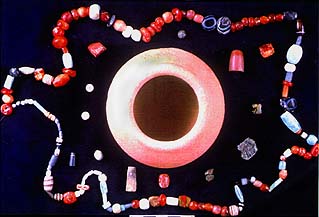
The Harappa Archaeological Research Project or HARP was begun in 1986 as a long term program of investigations into the origins and character of Indus urban centers. It is the first multidisciplinary excavation of an ancient Indus urban center and involves scholars from all over the world.
It was initiated at Harappa in Punjab Province, Pakistan by the late Professor George F. Dales and Dr. J. M. Kenoyer. In 1992, the original University of California-Berkeley project was transformed into the Harappa Archaeological Research Project, directed by Drs. R.H. Meadow (Harvard University), J. Mark Kenoyer (University of Wisconsin-Madison) and Rita P. Wright (New York University).
Excavations by HARP are conducted in collaboration with the Department of Archaeology and Museums, Government of Pakistan.
HARP has been supported by the National Endowment for the Humanities (NEH), the National Geographic Society, the American School of Prehistoric Research (Peabody Museum of Archaeology and Ethnology, Harvard University), Harvard University, the University of Wisconsin, New York University, the Smithsonian Institution, the Kress Foundation, the Wenner-Gren Foundation, Harappa.com and private donors.
HARP recently received an NEH Grant for the 1999-2001 period eligible for Federal Matching Funds. Private and corporate contributions are matched 1:1 (i.e., doubled). Contributions can be made out to the University of Wisconsin-Madison and sent to Dr. Mark Kenoyer, Dept. of Anthropology-Madison, 1180 Observatory Drive, University of Wisconsin, Madison, WI 53706. Feel free to request further information.
Some of the results of HARP's excavations were shown in the Ancient Cities of the Indus Exhibition in the US in 1998-99.
